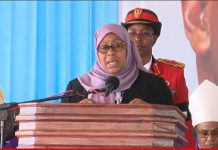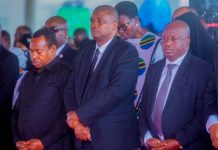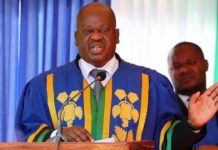AfricaPress-Tanzania: THE Attorney General (AG) has asked the High Court to dismiss with costs the constitutional petition lodged by Advocate Paul Kaunda, challenging the Speaker of the National Assembly’s decision to recognise Mr Cecil Mwambe as a Member of Parliament (MP) under the Chadema ticket.
State lawyers, comprising Principal State Attorneys Vicent Tango, George Mandepo and Alecia Mbuya as well as State Attorney Erign Rumisha, told the High Court panel comprising Judges Issa Maige, Stephen Magoiga and Seif Kulita that the petition is unmaintainable in law.
They submitted that Mr Kaunda, who is the petitioner, has no locus standi to present the petition as there were no rights involving him that had been violated under the constitution to warrant the court to intervene in the matter.
According to the lawyers, the court has not been clothed with jurisdiction to entertain the petition and subsequently grant the reliefs sought as per provisions of Article 100 (1) of Constitution of the United Republic of Tanzania and Section 3 of the Parliamentary Immunities, Powers and Privileges Act.
They argued that what were being complained of were matters that happened in Parliament, which could not be questioned.
The State lawyers were of the firm views that it was Article 100 (1) of the Constitution and other laws, which protect matters happening before the debating chamber.
The present petition, according to the state attorneys, was incompetent and bad in law for contravening the provisions of section 1 (2), 3, 4, 6 (d) and 8 (1) (b) of the Basic Rights and Duties Enforcement Act and Article 26 (2) of the Constitution.
They submitted that the petitioner had failed to cite the relevant laws that could empower the court to entertain the petition.
Furthermore, the lawyers argued that the petition is incompetent and bad in law for being frivolous, vexatious and unjustifiable.
Expounding further, the state attorneys told the court that there was no chances on part of the petitioner to succeed because the court cannot grant the relief sought.
In addition, they argued, the affidavit in support of the petition is incurably defective.
The lawyers submitted that the affidavit contravenes Order XIX Rule 3 of the Civil Procedure Code for containing extraneous matters, which the petition had not verified or disclosed the sources of the facts he so stated and affirmed.
Responding to the submissions, however, Advocates Fulgence Massawe, Daimu Halfan, Stephen Mwakiborwa and Prisca Chogero, who are representing Mr Kaunda, requested the court to overrule the grounds of objections raised and order the hearing and determination of the petition on merits.
They forcefully submitted that the petitioner was vested with powers under Article 26 (2) of the Constitution to bring the constitutional action to court.
Such provision allows anybody to seek court’s redress upon observing any breach of the constitution.
The advocates told the court that the petitioner was not required to cite enabling provisions that empowers the court to determine the petition.
They submitted that what the petitioner was required to do was to just cite the provision, which empowered him to knock court doors for interventions.
On the questions of frivolous, vexatious and unjustifiable, the defence lawyers responded that the constitution spells out, in particular under Article 7, what matters that one cannot demand from the court, but the rest could be claimed and granted after going into the merits of the dispute involved.







